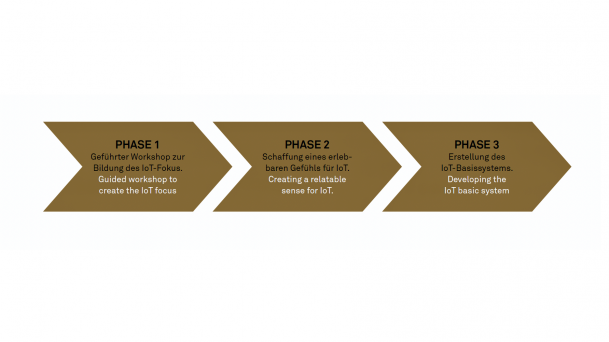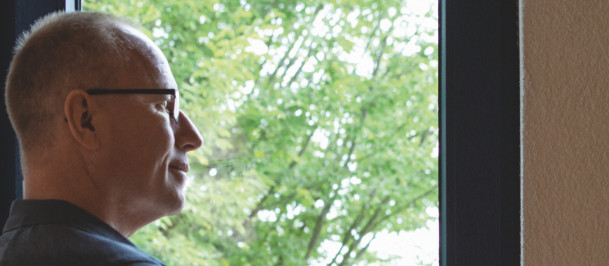Keep It Simple!
In their private lives, many people take digitization for granted. In companies, however, people occasionally struggle with it. The company konzeptpark GmbH makes it easier for them. In our interview, managing director Markus Karen explains how they proceed and succeed.
When konzeptpark GmbH was founded in 1995, digitization was truly still in its infancy. Microsoft had just launched the first operating system with a graphical user interface: Windows 95. Getting a connection to the Internet via modem still sounded like Science Fiction. Mobile phones looked like bones and could actually only make phone calls. You always have to keep this in mind when founder Markus Karen talks about the self-conception of his company – which is to say about everything that is digitally feasible quite naturally today.
Down to the present day, the three pillars on which Markus Karen and Andreas Ascheneller have built and successively expanded their company are still consulting, system integration, and software development – for small or medium-sized enterprises and major corporations alike. The service portfolio ranges from customized cloud solutions or in-house data management platforms to IoT-solutions (Internet of Things). Markus Karen will tell us more about it.
W3+: Everybody is talking about digital transformation, about Industry 4.0, and the Internet of Things (IoT). The focus of your work has been on those subjects for quite long. Have you been ahead of your time?
Markus Karen: Oh, well. For almost thirty years now, our core business has basically consisted in developing digital solutions for manufacturing companies, service providers, and public transportation companies. Our knowledge and our experience in this field are indeed extremely valuable. But it is not our nature to pretend that we've always been turning the big wheel. Of course, digital transformation, Industry 4.0, and Internet of Things are the hottest topics at the moment. That’s a good thing – for us as well. But the implied hype also has its downsides.
W3+: What do you mean?
Markus Karen: From those so-called trends and buzzwords, the industry gets the impression: If you don’t join in, you will be left behind sooner or later. This forces especially small and medium-sized enterprises to act and it quite often creates fear of embarking on something new, which in turn leads to doing nothing for a start.
W3+: That is not really sensible but perfectly understandable.
Markus Karen: Our experience has shown that companies often lack the necessary qualifications to focus on dealing with digitization. There is no time and there are no free capacities in the operational business; there is a lack of competencies and responsibilities; in addition to that, there is a fear of new things combined with an incalculable risk.
W3+: So, where do you begin?
Markus Karen: First of all, we try to discuss the apparently overwhelming issues of digitization on equal footing with the customers. We rely on substantiated consulting instead of geek speak. And we give people a simple and evident maxim: Just do it! In German, this has a second meaning: Keep it as simple as possible! Digitization doesn’t have to be big, complicated, complex, and costly per se. It is much more important to take the companies by the hand and find out together how they may improve their products and make them smarter by using digitization. This is exactly what we do.
W3+: And how do you get there?
Markus Karen: Most certainly not from the end where there may already be a visionary concept which will bring everybody to their knees long before it has been achieved at all. We proceed step by step. And sometimes, it is exactly the small steps which set something bigger rolling.

»We developed the 3-Phase Focus Method so that small and medium-sized enterprises are able to realize their digitization projects without any risks and with quick results.«
Markus Karen
W3+: For this purpose, you invented the 3-Phase Focus Method of implementing IoT projects in companies in an efficient, resource-saving, and expedient way.
Markus Karen: Correct. We developed the 3-Phase Focus Method so that small and medium-sized enterprises are able to realize their digitization projects without any risks and with quick results. The word “focus” is essential because the method is focusing on the specific requirements and potentials of the company in question. At the beginning, in the first phase, there is a guided workshop of experts answering open questions about everything to do with digitization. We don’t involve only the IT experts here but all sectors of the company which have to do with production and are part of the product engineering process. In conjunction with each other, we work out an IoT focus on the basis of which we will develop an individual functional model, that is an IoT basis system, which is customized to the respective company. In the third phase, things are getting concrete: The IoT basis system is created, tested and put into operation. We won’t leave our customers “out in the cold” afterwards, either – we advise them on their subsequent development with state-of-the-art agile methods and also support them in establishing new business models.
W3+: That means, you don’t content yourself with providing technological solutions or standards but point out in which ways the company may use digitization to offer new products or services?
Markus Karen: In the best case, the one results from the other. There are, for example, OPC UA data exchange standards which are relevant for communicating all pertinent machine-data as well as error or warning messages. This actually opens up completely new possibilities. In a digitization project with company WIWA Wilhelm Wagner GmbH & Co. KG in Lahnau, one of the leading manufacturers of paint spraying devices and injection systems, we made their machinery capable for OPC UA. This in turn led to a new project which is to our mutual benefit: a Multiconnector Edge Gateway to OPC UA standard through which all machinery – even the old systems – is able to communicate. It enables especially SMEs to take advantage of digitization without enormous investment costs or major conversion schemes
W3+: Is such an added value rather the exception or the rule?
Markus Karen: It is absolutely exemplary for our work that we generate an actual added value in the course of any digitization projects. In the project with WIWA, we benefited from sponsorship by the program Distr@l – a funding program which is expressly aimed at startup companies, SMEs as well as academies and research facilities which are advancing the digitization process in Hessen with innovative projects. We will gladly help enterprises from the region in this respect as well.
W3+: As one of the initiators of the IoT-Offensive Germany you attempt to get enterprises interested in digitization and point out the potentials. Is it right to say that you always have to keep an eye on the big picture while not losing track of the specific requirements and capabilities on the small scale?
Markus Karen: This is in fact not that easy. But it corresponds to our self-conception that we don’t want to sell castles in the air to our customers but reliable and viable solutions which we will work out together. That and how new or better products can be created with the aid of digitization is what we try to identify in the implementation so to say. My involvement as co-initiator of IoT-Offensive Germany follows the same serious objectives – combined with the understanding that we as an enterprise will not achieve anything with our methodology alone. There are things for which you need allies who are just as convinced of the subject matter as we are. Our initiative is pooling these strengths. Using the combined strengths of economy and science we want to cultivate German medium-sized companies into market leaders with regards to digitization and IoT until 2030. And perhaps, we in Central Hessen can be at the forefront.
Additional Information:
